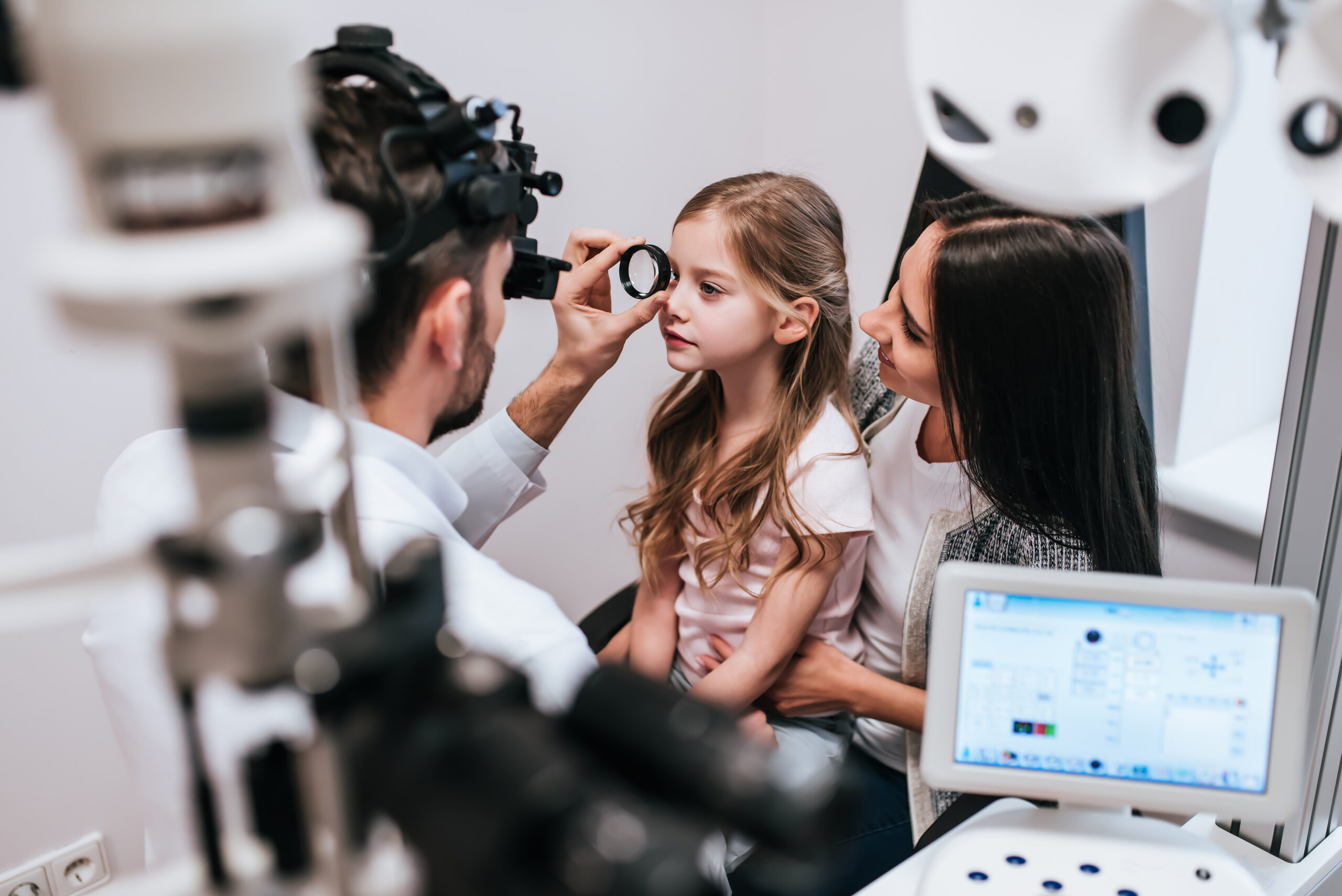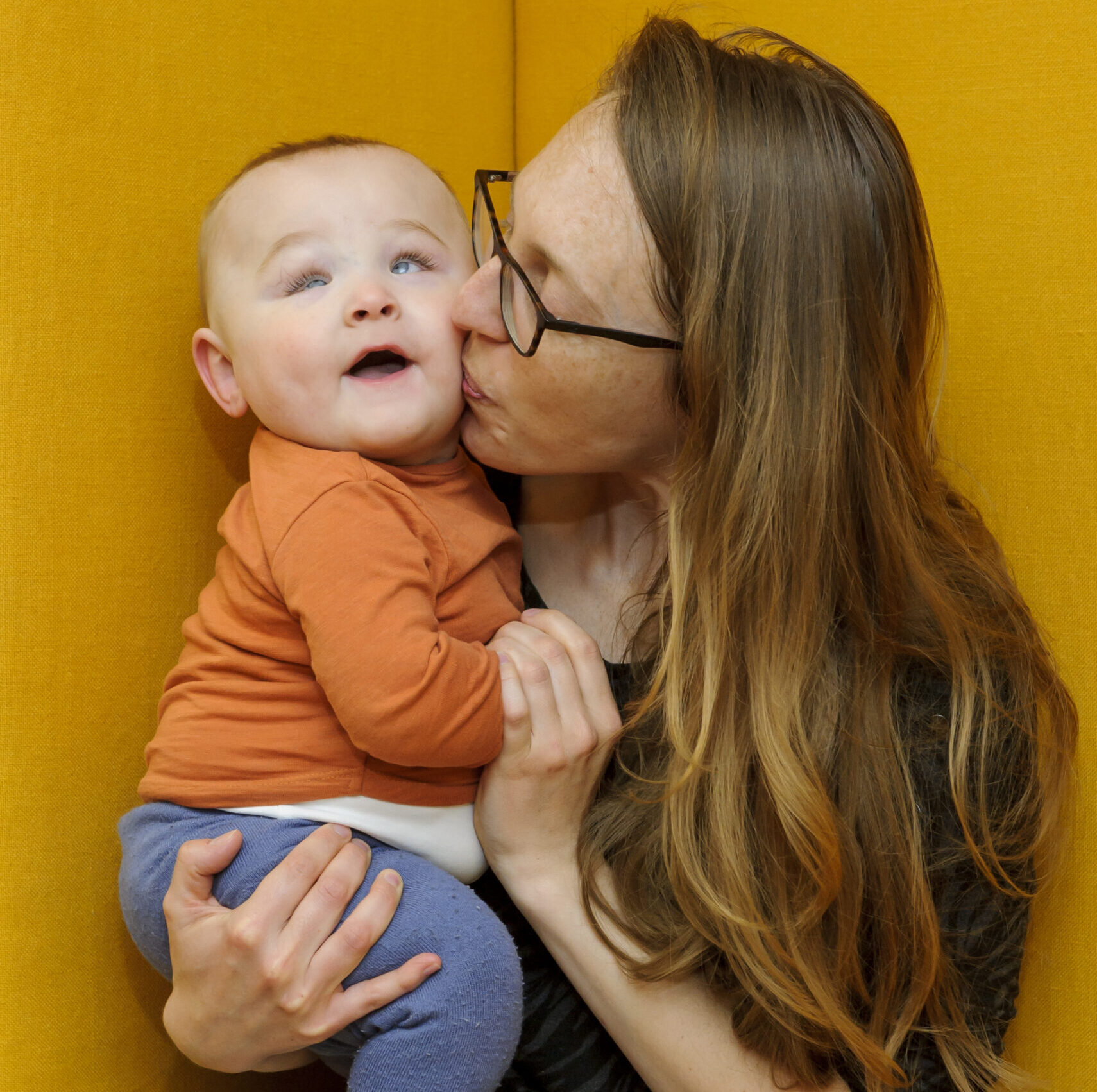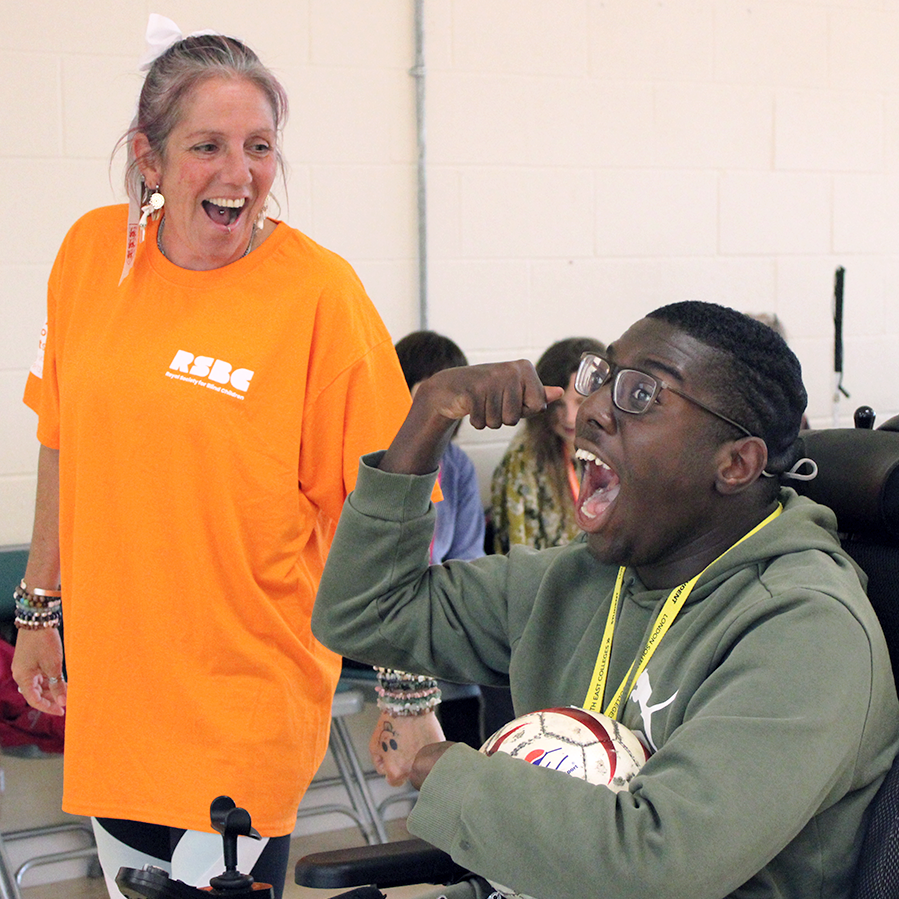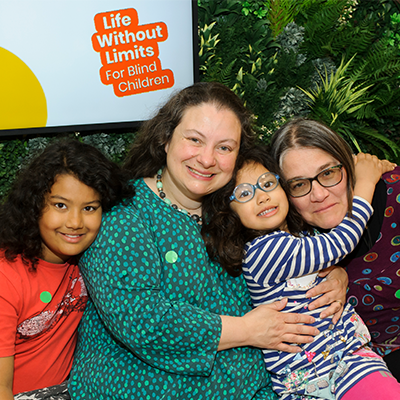Pride: Celebrating our people
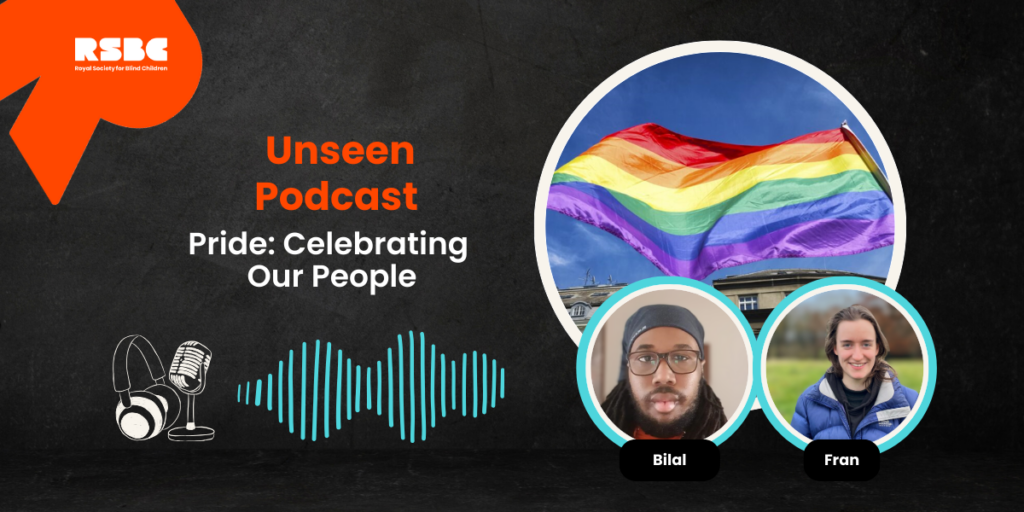
On this Pride-themed episode of the Youth Forum’s Unseen Podcast, the RSBC’s LGBTQIA+ Youth Group discuss what it means to inhabit the intersecting spaces of vision impairment and queerness. We also talk about our queer icons, and the group’s plans for the future.
Don’t forget to let us know your thoughts by getting in touch at youth.forum@rsbc.org.uk.
Listen to the episode
Transcript
Fran
Hi there, this is Fran part of the staff team at the RSBC, and we are here to record, the youth forums unseen podcast and this is a special pride edition. We are recording it in June, which is Pride Month. Let me throw it over to my co host Mark.
Mark
Thank you very much Fran. I’m Mark. I’m one of the staff team here at RSBC, so I think my job and Fran’s today as referee, or umpire or ombudsman or people Wrangler, is just to keep things in order and on topic, but we’ll be taking a backseat. And really making sure that we’re we’re able to center the ideas and opinions and statements of the young people who take part in our group. So without further ado, maybe we should ask them to introduce themselves. So here we go. Who wants to volunteer?
Jordan
Hello, I am Jordan Knight. And I am for 13, she/they. I also live in Wales. Now may I pass the mic to Eliza?
Eliza
So I’m Eliza. And my pronouns are she/her. And I’m 16 and I live in
Mark
Thanks Eliza.
Bilal
Hi, I’m Bilal. My pronouns are both he him and they them. I am 26 just had a birthday yesterday, fun time.
And I live in southeast London.
Fran
Thanks so much, guys. For those introductions. Yeah, as we’ve said, this is a special occasion. Because it’s Pride Month. And I think that might be a nice way to kick things off. So Could one of you tell us about pride and what it means to you?
Read More
Eliza
Yeah, for me, pride is there like is the promotion of self acceptance, like celebrating you or others as a person and who they are. And like, being proud in yourself. It’s also about like, equality, and acceptance for overall people who identify as LGBTQ plus. For me, pride feels like a celebration of my people. And I feel proud to be part of it. Yeah.
Fran
Thanks, Eliza. Bilal. Do you have anything you’d like to add?
Bilal
that’s difficult to top to be fair because i was thinking the exact same thing
Speaker 1
Yeah, I think Eliza put it pretty well, there celebration of our people is about right. Yeah.
Mark
I like the idea that our people can be whoever we and they decide they are that the tribe or the tribes are kind of soft around the edges. And they shape shift and move and definitions change. And we get to decide from the inside rather than anyone outside. I think that’s a really great phrase Eliza. Definitely. So that set the context in terms of June being Pride Month. But I guess it’s important to set the scene a little further, because I guess a lot of people who are listening in are not so familiar with RSBC, and are not so familiar with this group, which at the risk of saying it again and again, is ground-breaking, for reasons we’ll discover as we go forward. So Eliza, do you maybe want to share with us a bit about what the group is how we came about what we do, what the purpose is what happens?
Eliza
Sure. So our LGBTQ plus group is a group of Vi people who are also a part of LGBTQ plus, or are allies with us. We meet once a month with a range of different things in our monthly meetings, from celebrating particular people in the VI and LGBTQ plus community, talking about life as a VI on person, and also being part of the LGBTQ plus, and the struggles, in my experience. Talking about events, we might be interested in going to accessibility of pride and pride month and Vi and disabled people finally doing a podcast like this one, and making awareness in our local communities and nationwide.
Speaker 1
Yeah, it’s definitely something we talk about and think about quite a lot, that kind of having that shared identity of being queer and VI. And
Mark
I think as well, it’s about having that sense of a shared culture. So I think in terms of the monthly to and fro lots of stuff is around sharing information about passing connections and links and recommendations around about things that are happening events, culture, connections, ways of again, of establishing who our people are to use Eliza’s brilliant phrase from earlier.
Speaker 1
Yeah, I think for, for me and Mark, it’s a bit of an education. And I think, finding out and talking about what queer media and culture looks like for young people today is a bit of an education for us, for you more so than for me Mark
Mark
thank you. I only come here for the compliments. But I wonder if I can ask you both Bilal and Eliza about what it was that you responded to when you heard that the group was was going to be forming about what made you want to be a part of that
Bilal
That’s a very good question, actually. Thank you for that mark. So when I first heard of the group, I was like, Oh my gosh, finally, some representation. And I was like, Yes, let’s go for it, basically.
Eliza
Oh, we needed this. Like, this was just perfect. So I had to join it.
Speaker 1
Jordan, I’m wondering if you could jump in and tell us what does it mean to be a queer VI person? And how is it different from being just queer or just VI?
Jordan
Well, it means that we have two minorities on our side, which is not always the best, because the LGBTQ community are prosecuted, and disliked by many different groups. But visually impaired people are mostly seen as weak and well impaired
Eliza
Personally, it does come with a lot more challenges than just being queer, for example, being queer is often judged in society, and being VR and disabled is also often quite a judgmental position to be in. So yeah, trying to balance those is quite hard.
it means a lot to be part of it. And yeah, I’m just generally proud. Yeah,
Speaker 1
I mean, I think that’s what Pride Month is all about, right? I mean, maybe we’re doubly proud. What do you think, Bill?
Bilal
I totally agree to be fair, I’m not going to lie
I when when we think about those sort of multiple identities, or those those kind of layered identities? Again, this may be an unfair question, but I’m thinking about maybe how other people’s or people who are outside the lived experience sometimes perceive it? Does one come before the other? Do they kind of sit side by side by side in terms of how we define ourselves or how other people might perceive this? What’s your feelings about that? Are you queer first and Vi second, or VI first and queer second, or both simultaneously? And in every sort of possible way?
That is actually an intriguing question I’m not going to lie. I need to think here. Oh gosh, I guess I would say, I mean obviously it’s different for other people but for me personally I would say VI first because I was born VI but then queer second because aftwerwards its like oh my gosh yeah okay that is me
Eliza
I agree. Yeah, that’s the same for me. I would definitely say vi first is, yeah, I was born with it. So yeah
Speaker 1
I think that’s what makes our group special or unique, because we are a VI organization. And we understand the challenges of being VI. And it’s nice to be able to create a queer space within that.
Mark
And I think that is the thing that’s ground-breaking about this group. And anyone who’s listening in who wants to correct us, please do so. But as far as we’re aware, we’re the only vi queer youth group in the UK. So I think that gives us a real sort of leading edge, and an opportunity to really kind of explore and break new ground and again, define what we’re doing and who we’re doing it for. And why. If I can ask you both. So really coming off that those statements that you made around those, multiple identities, and again, how they’re how we’re perceived and some of the difficulties that they may pose, or either that the external world may pose in terms of how it perceives you. What what are some of those myths or those ignorant perceptions that you’ve come up against? Let’s bust a few myths here in the absence of any jaws to bust instead, what are the things that really kind of vaccine and rile you in terms of myths or preconceptions about what it is to be queer and VI?
Bilal
I mean oh it’s very good question. I mean, could you like Mark think of like any off the top of your head, or like, yeah,
Mark
that oh, that’s putting me on the spot now, which is a really clever thing to do in a situation like this
I’m loving it! And I suppose I have to, in the interest of full disclosure, make make clear that I don’t have a VI in this context, I’m not within within the lived experience. So I’m treading on eggshells as well here waiting for you guys to correct me and saying what the hell are you talking about? I suppose one thing that occurs and I guess it might apply across disabled communities of all sorts is that, again, that perception or that myth is that somehow Having a disability infantilizes you, you know, kind of reduces people to a sort of permanently vulnerable kind of childhood state where they’re not never seen as fully mature and therefore don’t develop a sexuality or a kind of adult identity. And I’m wondering if that’s something that we’ve experienced or encountered just again, in terms of the way that people feel about so maybe the way in particularly that people might react when when we disclose our sexuality or gender identity? Yeah, I
Eliza
would agree with that. Yeah, I’ve had, I’ve had some experiences, it’s like, people seem to think well, like, when you’re disabled or neurodivergent,
you can’t really grow up.
We’re like, stuck in this trap.
So yeah, and I’ve definitely, I’ve even experienced that with counselling. So it’s like, yeah, it’s quite a um
It’s like, yeah, we can actually, we might need a bit more help, but we can. Yeah,
Speaker 1
definitely. I think it’s about breaking down misconceptions, that sort of thing. Bilal, do you have anything on a similar note that you’d like to share?
Bilal
I was gonna say, I have actually had like a few incidences mainly in the past, like many when I was in secondary school. So like, when I would disclose that, like, I’m visually impaired, everyone would like always feel sorry for me, like that. But like, then again, like, because I was born visually impaired, I kind of had to, like adjust very quickly. So like, I already kind of like had things handled. If you know what I mean,
Eliza
yeah, it’s like, you say you’re visually impaired and they’re like, Oh, I’m just so sorry. It’s like Thanks. It’s like, how
do you respond to that? Yeah, I’ve definitely had that one. I’ve had one. Like, was like, Oh, why are you like looking at me? Aren’t you blind? It’s like, no. It’s a massive spectrum. It’s just yeah
I think that’s probably the main one. I get the visual impairment. Yeah.
Speaker 1
Yeah, I think it comes up quite a lot in our work with VI young people that people are scared of the unknown. And that might be Vi or disability related. And actually, there’s, like you say, Nothing to be sorry, for, you know, hopefully, you guys are proud of who you are. And that comes with all those myriad identities, you know, of queerness VI.
Eliza
Yeah. And I think that’s not just like, with the eyes as well, because I’ve got other disabilities, and it’s the same thing. It’s like, I tell him, I just heard he’s like, Oh, I’m so sorry. And I’m like, no, just like, I’m, I’m proud of who I am. But yeah, I might have more challenges. And yeah, it might be more tough. But, you know, if I wasn’t like this, and it’ll be completely different. And I probably wouldn’t be in all of these groups, and I probably wouldn’t be as proud. So it’s like, yeah, we don’t need the apologizing these.
Speaker 1
So yeah, yeah, listeners, be warned, we don’t need your apologies. I think that brings us nicely on to some discussion about queer icons. Mark, this was an idea that you introduced to the group. Yeah,
Mark
I mean, I guess, again, betraying my age and wanting to feel I had some relevance in the group. I thought it was interesting to introduce a historical theme. But I think also, more seriously, I think, within all sorts of marginalized communities, whether we’re talking about people of color, or people with disabilities or within the LGBTQIA plus, community is really important to know your history, because so often that history is buried, hidden, obscured, kept away from you, or is problematized, or seen as being inappropriate in some way. And I think feeling connected with that, again, going back to what Eliza said about at the beginning, about knowing who your people are, and where you come from, and where you stand in relation to those and where your solidarity is, particularly when when things are tough, and you need to make a stand about something. It felt that it was kind of interesting there. And I get and again, I guess selfishly being an old man, I think I can say that. Being an older man, just just to take the pulse of where things are at right now. You know, the world in which I grew up in and sort of had my formative experiences was very different. That goes without saying, but just in terms of terminology in terms of people how people thought about and responded to the word queer itself, which is perhaps a conversation we can have about what that means to everyone. But the thing about Yeah, like explore, exploring queer icons, I suppose, was to build a sort of a gallery or a museum or Pantheon, if you will, of people who we kind of admire, or we see as allies or who we feel there’s something of interest or importance to us as a community to kind of think about and talk about what is what is the team for who your icons and what does that concept mean to you? Is that important to you?
Jordan
Um queer icons. I have a few specifically a few youtubers characters from media You know, the essentials, one of my older queer icons is definitely Apollo, known for having his lovers die in awful ways. And sometimes those relationships turned out well, he did have relationships with both genders. And from another recent piece of media blitz, so almost dowless
Bilal
I mean, I would definitely say that icons are definitely important, mainly because well, not just because like that they’re famous or like, a huge celebrity. But like, they can also kind of like, they have more like outreach, if you know, I mean, and obviously, like, icons, like don’t have to be like queer, they can be the allies as well. Kinda like Lady Gaga, for example. She like does a lot for the community as well. Yeah, she’s a fierce ally. Here.
Speaker 1
We’ve talked quite a lot about sis women who are popped by cons, who are also allies. We’ve had the Spice Girls have come up. We talked about Kylie. So yeah, there’s definitely definitely something there. And I think, in a way, it’s a really nice thing to have a significant amount of your Popstar identity be aboutbeing an ally. Could we talk a bit more about why the group talks about queer icons? Is that something aspirational? Inspirational? Yeah,
Eliza
I would say definitely, I think for me, it’s definitely an inspirational, but also Yeah, looking back at the history, and like, seeing like how Viacom but also like ways, we could still improve and things.
Speaker 1
Yeah, when you talk about improvement, I’m kind of drawn to thinking about fictional queer icons, because in our sessions, we’ve definitely talked a little bit about fictional spaces where we can have queer ideals. Jordan, can you tell me more about that? You’ve been discussing queer icons in a fictional realm, especially.
Jordan
Alright. Queer icons are extremely important.
Fran
Tell me more Jordan, I,
Jordan
I typically have a non binary protagonist because she they icon. But non binary protags are easily very easy to write. Because you don’t need to add one, you don’t need to add certain gender stipulations for them.
Speaker 1
Yeah, I like that idea, writing what you want to see, you know, reclaiming the narrative.
Mark
And I think that’s really important in the sense of reclaiming stuff and stealing it back. You know, again, when you’re, you’re within a marginalized community, stuff gets taken from you, you don’t have access to stuff. So I think of it almost like a kind of hip hop or dance music culture, where you’re just sampling and taking bits of everything, because it means something to you. And you’re kind of assembling your own culture and your own sensibility from that. And so therefore, anything is fair game, the street finds its own uses. So you pull in whatever, whatever reference points are meaningful to you. But I don’t think I got a direct answer to my question earlier, which is fair enough, because it does put everyone on the spot, but I’m just interested. I mean, we’ve mentioned a few names there. But other people for you, both individually, who have been kind of important as icons in one respect, or another fictional, current living or dead or whatever, but who were kind of important or inspirational figures or who kind of helped you develop a sense of who you are and where you stood?
Eliza
Oh I would say there has been many, I can’t name because, like, think of them specifically. But I would say that yeah, there has been definitely, like, but I, for me, it’s more not just like, the, the people who are part of LGBTQ but also like, those who are disabled as well, because I find it it kind of combines both together. And for me, that’s, like, really helpful. So yeah, definitely, those have been just, like, inspirational, but they’ve just also, like, helped me, you know, like, find my journey and those kinds of things. Yeah.
Bilal
Great, 100% I mean, especially also, like, when you find like, an icon, that like, you can like, relate to like, in more ways than one. So like, say if they have like, kind of like multiple disabilities, and like you have like similar. So like,
autism, for example. I mean, I’m autistic as well.
Like, it’s actually good to like, have that kind of connection as well. Like, oh, my gosh, this person has been through some of the things that I’ve been through. And like we can kind of like see each other’s point of views and stuff like that, that kind of thing. I
Speaker 1
think that brings it to quite a nice point. They’re really about one of the special things about this group. I know we’re banging on about it, but you know, way, group members are kind of able to be there, each other’s queer icons if you’d like, you know, you guys all have quite unique marginal experience here of occupying these two worlds of being VI and being queer, and maybe other things on top of that. And it’s a nice space to sound ideas off each other or say, Oh, you really relate to this experience. And I think probably honing in on that kind of special aspect of this group is a nice way to wind down.
Mark
Should we maybe think ahead, just as we’re as friends as creeping slowly towards the exit door. We’re in, we’re coming to the end of Pride Month, at the moment. So thinking about the year ahead, which I know is always a wildly risky, if not ambitious thing to do. But thinking about the year ahead, in terms of things maybe that it might be interesting for the group to do or that you’d like the group to explore in that time. What what what things did you think, in addition to what we already do, that might be interesting directions for our group to play around and explore and to move towards?
Bilal
Our say, I mean, don’t get me wrong, like what we already do like is like, great so far, but like, obviously, like, what we do so far is mainly virtually, like it would actually be like, nice to like, actually have like meeting groups and stuff like that. And meeting points. Like, obviously, like, not everyone in the group is actually from London, but outside of London? I think so. Yeah, I would say like, yeah, a different kind of meeting point is one inside one outside London, just like, meet up and just like, do an activity, something like that you know what I mean
Speaker 2
Oh, definitely. Yeah, definitely meet up like that That was the only thing I was gonna say.
Eliza
Yeah, those things are certainly possibilities. And especially the more our group grows, be that with new members, people who are curious questioning who want to check it out who are VI, or perhaps other organizations who’d be keen to partner with us for an event, you know, anyone out there, watch this space, and do get in contact if you’d like to collaborate? Because I think those things are all exciting things to come.
Bilal
Indeed we’re broadening the scope. And
Speaker 1
yeah, we did have talk of satanic cults in our last session. I think we definitely did. Yeah.
Mark
It’s not all fun is it
Speaker 1
all that a more on the first Wednesday of every month, from five to six on Zoom? At the LGBTQiA plus youth group? With the RSBC yeah whether you’re an organization looking to collaborate. Maybe you’re a VR young person who’s queer or questioning, and you’d like to meet some other like minded people. Yeah, all are welcome. I think that brings us to an end. That’s been great. Thanks, everyone. Yeah, thank you so much for listening. And thank you so much to my co host, Mark, and of course, Jordan, Eliza and Bilal for giving the voice of our group members. Yeah tune in next time to the RSBCs
Fran
. youth forums unseen podcast on all the usual channels.
Transcribed by https://otter.ai
